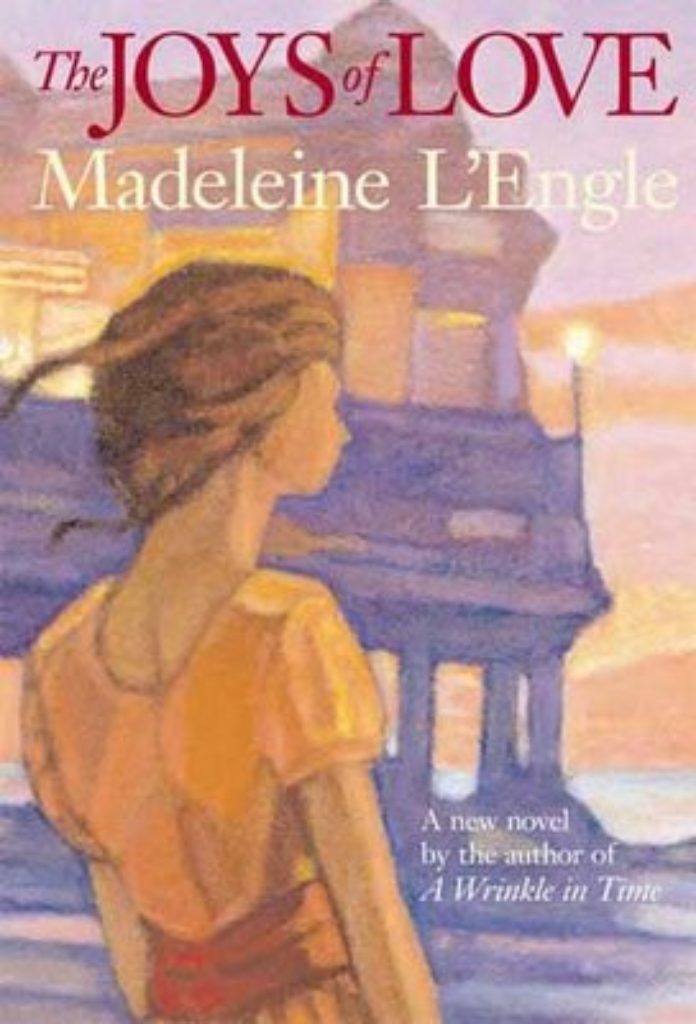The Joys of Love by Madeleine L’Engle has been reviewed by Focus on the Family’s marriage and parenting magazine.

The Joys of Love by Madeleine L’Engle has been reviewed by Focus on the Family’s marriage and parenting magazine.
Twenty-year-old orphan Elizabeth Jerrold, whose dream has always been to be an actress, has landed a scholarship for a summer internship in a seaside theatre company, much to her maiden aunt’s chagrin. Elizabeth, who has a naïve enthusiasm for everything having to do with the theatre, falls in love with the director of the company, Kurt Canitz, a womanizer. Ben Walton, the assistant stage manager, warns her that she is setting herself up for a fall, but Elizabeth believes Kurt loves her as much as she loves him.
Kurt leads her on and then has her visit him in his room. He tries to force his attentions on her. She refuses and escapes. The next morning, she sees another woman leave Kurt’s room and becomes disillusioned with both Kurt and the theatre. Kurt later seeks her out, hoping she isn’t angry about what happened. He points out that she should have expected him to want her in that way. She realizes that they don’t understand love in the same way, and she asks him to leave her alone.
Ben, who is her best friend and has loved her all along, tells her that the theatre has both good and bad, and she needs to wade through the bad without letting it taint her. He tells her he wants to marry her but will wait six months to court her honorably. Elizabeth appears to accept his plan. She returns home because her aunt stops paying her room and board midsummer, but her friend’s aunt, a professional actress, offers to help her get started in the theatre as a paid understudy if she comes to New York in September. Elizabeth accepts.
Elizabeth says that her aunt thinks the theatre is Satan’s invention and that her aunt decided to raise her out of Christian duty but didn’t really want her. Elizabeth asks a friend to stop her if her friend ever sees Elizabeth do something out of Christian duty, but the friend says that Elizabeth’s too good a Christian to do that. There is one instance of a man saying grace, and Elizabeth has a general sense of good morals, which she seems willing at times to reconsider. Sundays are for sleeping in and going to the beach.
None, however, Kurt talks about an “outmoded moral code.”
Elizabeth never knew her mother, and her father died when she was young. Her maiden aunt finished raising her. Elizabeth shows little respect for her aunt. The woman is portrayed as cold, unloving and prudish, someone who doesn’t understand Elizabeth’s need for love or her passion for becoming an actress. A character calls the aunt an old witch.
There are several uses of d–n, d–ned, h—, b–tard, and a single use of a– and b–ched. The name of God is used flippantly.
Several instances of kissing occur throughout the story, and one is of a couple embracing passionately on a couch in the darkened living room. One girl jokingly refers to the common ruse of a man asking a woman to his hotel room to view his etchings. The young people mention “a House,” implying a house of ill repute, and one comments that people on the second floor should change their profession, implying frequent sexual activity.
Kurt asks Elizabeth if another couple they both know sleeps together. Elizabeth goes to Kurt’s room and comments that her aunt would consider her a fallen woman for doing so. While dancing, Elizabeth feels Kurt’s legs and body pressed against hers. Kurt and Elizabeth philosophically discuss her falling in love with a married man. Kurt invites Elizabeth back to his room and tries to force himself on her. The next morning Elizabeth sees another woman leaving Kurt’s room, implying that the other woman had spent the night with him. Kurt asks whether Elizabeth didn’t expect him to want her physically.
Get free discussion questions for this book and others, at FocusOnTheFamily.com/discuss-books.
Alcohol: There are references to and some occurrences of drunkenness, smoking and drinking by adults throughout the book. Elizabeth refuses to drink because she is under 21.
Gambling:* There is one instance of poker playing, apparently with betting.
The author, Madeleine L’Engle, won the 1963 Newbery Medal for A Wrinkle in Time and her book A Ring of Endless Light was a 1981 Newbery Honor book. This book was found by her granddaughters and published after her death.
You can request a review of a title you can’t find at [email protected].
Book reviews cover the content, themes and worldviews of fiction books, not their literary merit, and equip parents to decide whether a book is appropriate for their children. The inclusion of a book’s review does not constitute an endorsement by Focus on the Family.